HULK smash… puny preconceptions and manipulated memories
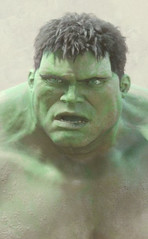 by James Harleman, Cinemagogue Editor-in-Chief
by James Harleman, Cinemagogue Editor-in-Chief
“The first Hulk movie was a failure!”
“The first one bombed at the box office!”
“The previous movie didn’t have enough Hulk!”
“The Hulk effects looked like crap!”
“Ang Lee’s movie was depressing!”
And so on… and so on… and so on. As The Incredible Hulk smashed into theaters June 13th, the old rants about Ang Lee’s ponderous epic Hulk emerged again, with some new whining that even the jade goliath himself would probably snort at. Seriously, it’s an interesting cultural study in media spin and short memories to see how both Hollywood and humanity are transformed, like gamma rays, by marketing and snappy judgments.
Think you have a TRUE memory of this corner of our earlier decade? Think again.
As I mentioned in my own Incredible Hulk review, I grew up watching the 70s television show with my Dad. I have read the Hulk since the late 80s, and own EVERY Hulk comic. Seriously. While I may not be the strongest one there is, I certainly have some qualifications when it comes to the adaptation of this green goliath. I walked out of Ang Lee’s 2003 magnum hulkus with my father and a warm smile on my face… 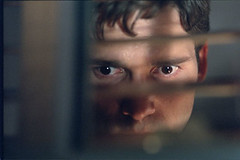 and found out that almost nobody else got it.
and found out that almost nobody else got it.
A few critics did. In fact, Erik Sofge at Slate.com just posted “In Defense of Hulk”, a truly thought provoking article that examines the uniqueness and ambition of the Lee film that’s well worth the read. Roger Ebert also put it succinctly in his 2003 review: “Ang Lee’s Hulk is the most talkative and thoughtful recent comic book adaptation. He is trying here to actually deal with the issues in the story of the Hulk, instead of simply cutting to brainless special effects… this is a comic book movie for people who wouldn’t be caught dead at a comic book movie.” Reviewer Chad Law said “Putting an acclaimed director like Ang Lee (Sense and Sensibility; Crouching Tiger, Hidden Dragon) at the helm was a good idea! With The Hulk, Lee has made the biggest budget art film to date.”
Nevertheless, The Incredible Hulk came out this summer, just five years later but as a reboot trying to erase the “mistake” of the first film. While I enjoyed the new movie, I can’t help but notice the “spincongruities” at play, which are more irritating than incredible.
“The first Hulk movie was a failure! It bombed at the box office!”
The 2003 film cost $137 million, made $62.1 million opening weekend, and ultimately made $245.4 million (not including merchandising and DVD sales). By comparison, The Incredible Hulk has been declared a “BIG success”, costing $150 million and bringing in… $55.4 million its opening weekend – less than Hulk (final box office for the latter TBD).
And as far as reviews, if Hulk was SO bad and the Incredible Hulk such a great reboot, how come their review score is only 5% different? The Incredible Hulk’s Rotten Tomatoes score of 66% has been referred to as success, but Hulk scored 61%. I’m not a mathematician, but something doesn’t add up.
“The Previous Movie didn’t have enough Hulk”
 In Hulk, Banner transforms and destroys his lab. He shortly hulks out in his house and soundly trounces his guards. He then engages in a savage brawl to save Betty from mutated canines at her cabin. Later, he breaks free in an underground military complex and reduces it to scrap. He engages in a battle with tanks in the desert sand; he takes on three Comanche helicopters amidst rocky crags and cliffs. He rides an airplane up into the stratosphere, then destroys the streets of San Francisco. The film climaxes as he Hulks out and eventually fights his transformed father. Score – four hulk-outs.
In Hulk, Banner transforms and destroys his lab. He shortly hulks out in his house and soundly trounces his guards. He then engages in a savage brawl to save Betty from mutated canines at her cabin. Later, he breaks free in an underground military complex and reduces it to scrap. He engages in a battle with tanks in the desert sand; he takes on three Comanche helicopters amidst rocky crags and cliffs. He rides an airplane up into the stratosphere, then destroys the streets of San Francisco. The film climaxes as he Hulks out and eventually fights his transformed father. Score – four hulk-outs.
 In The Incredible Hulk, Banner transforms and fights some soldiers in a factory in Brazil. He hulks out fighting the military in a field near the University, and later fights the Abomination through the streets of New York into Harlem. Hulk-out score? Three.
In The Incredible Hulk, Banner transforms and fights some soldiers in a factory in Brazil. He hulks out fighting the military in a field near the University, and later fights the Abomination through the streets of New York into Harlem. Hulk-out score? Three.
Which movie had more Hulk? The former film was longer, true, but had more Hulk, whereas the latter seems lacking in both the Hulk AND character department. The director and actor Ed Norton were actually forced to cut over 70 minutes to get the film under two hours, which made the lead actor unhappy. While still enjoyable, what we have now is a swirling action film that lacks the humanity of the even the old Bill Bixby TV show. (I’m still hoping for an extended DVD with Norton’s trip to the Arctic and more scenes with Betty and her boyfriend Leonard that looked intriguing in the trailers).
“The Hulk effects looked like crap!”
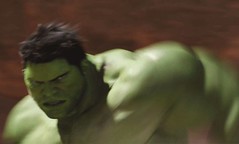 …yet another misconception, easily rectified by actually watching the two films back to back. People remember the poorly received trailers that ran during Superbowl XXXVII that Universal Pictures ran despite director Ang Lee’s protests. That, and a number of workprints leaked on the internet, furnished hungry viewers with incomplete visual effects that left a sour foretaste in everyone’s mouth… but were not representative of Lee’s painstakingly finished product.
…yet another misconception, easily rectified by actually watching the two films back to back. People remember the poorly received trailers that ran during Superbowl XXXVII that Universal Pictures ran despite director Ang Lee’s protests. That, and a number of workprints leaked on the internet, furnished hungry viewers with incomplete visual effects that left a sour foretaste in everyone’s mouth… but were not representative of Lee’s painstakingly finished product.
To be honest, watching both films on the same day, it is hard to argue with the fact that Lee’s Hulk scenes more often blend with the physical objects in the film 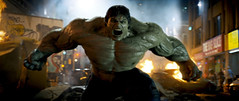 more seamlessly. Incredible director Louis Leterrier’s effects look good, but if you pay attention he uses smart editing to intentionally avoid a lot of interaction between the digital Hulk and real surroundings, with quick cuts to interstice the CGI and live actors. When they do, it looks less integrated than Lee’s version. The CGI looks neat, but more like watching an animated WWE fight than a real mutated human interacting with metal, sand, or a trembling father’s hand.
more seamlessly. Incredible director Louis Leterrier’s effects look good, but if you pay attention he uses smart editing to intentionally avoid a lot of interaction between the digital Hulk and real surroundings, with quick cuts to interstice the CGI and live actors. When they do, it looks less integrated than Lee’s version. The CGI looks neat, but more like watching an animated WWE fight than a real mutated human interacting with metal, sand, or a trembling father’s hand.
“Ang Lee’s movie was depressing!”
 This is NOT supposed to be Spider-man, morons. Even in the 70s, with the soulful “Lonely Man” piano theme, the Hulk was always a sad, somber tale of a haunted, hollow man broken by his nightmarish circumstances, hunted and hounded and never knowing peace. This is not a wise-cracking Tony Stark waiting to jump into his Iron pajamas and save the world. As Erik Sofge explains:
This is NOT supposed to be Spider-man, morons. Even in the 70s, with the soulful “Lonely Man” piano theme, the Hulk was always a sad, somber tale of a haunted, hollow man broken by his nightmarish circumstances, hunted and hounded and never knowing peace. This is not a wise-cracking Tony Stark waiting to jump into his Iron pajamas and save the world. As Erik Sofge explains:
“The tone of Hulk was a common problem for critics, who were expecting more upbeat summer fare. The screenwriters had ‘forgotten the simple joys of pop,’ Ty Burr wrote in the Boston Globe. ‘And isn’t that why we pick up a comic in the first place?'”
Ty Burr shows the ignorance of someone who has never read a comic, relegating an entire medium to one emotional beat. It’s like suggesting all movies should be high drama, or all that “all novels should be comedies”. The range and tone of comic books has swung as wide as any other entertainment medium since the 1930s. Hulk defender Erik Sofge continues:
 “In your standard comic-book adaptation, there’s a moment when the superhero realizes his gift… stopping a power-mad, creatively dressed inventor… with a hoverboard. Lee’s Hulk, by contrast… isn’t even much of a hero. He’s a physical and psychological casualty who spends the entire movie trying to save himself, not the world.”
“In your standard comic-book adaptation, there’s a moment when the superhero realizes his gift… stopping a power-mad, creatively dressed inventor… with a hoverboard. Lee’s Hulk, by contrast… isn’t even much of a hero. He’s a physical and psychological casualty who spends the entire movie trying to save himself, not the world.”
“There are no benevolent nuggets of wisdom from the likes of Spider-Man’s saintly Aunt May or Batman’s martyred father. In Hulk, family ties are the alpha and omega of emotional trauma.”
Complaining that Ang Lee’s Hulk movie sucked because “it was depressing” is like suggesting that Jaws was stupid because “it had a shark in it”.
No one understands Hulk!
The emerald titan always complained about being misunderstood, and it appears his first foray into film suffered the same fate. It’s almost ironic. What’s more tragic is that even though his new film has given him street cred again, so many elements of our likes and dislike are motivated by preconceptions, marketing and media spin. 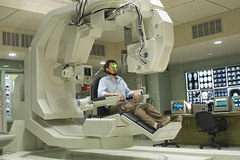 Like the cautionary tale that IS the Hulk, maybe we should look deeper into this and see how we allow ourselves to be manipulated and transformed by an influential culture. We can enjoy the 70s show, and the 2008 film, but let’s not simply buy the company line and let spin control and enough soundbites cage us. That would make the Hulk angry, and it should make us irritated too.
Like the cautionary tale that IS the Hulk, maybe we should look deeper into this and see how we allow ourselves to be manipulated and transformed by an influential culture. We can enjoy the 70s show, and the 2008 film, but let’s not simply buy the company line and let spin control and enough soundbites cage us. That would make the Hulk angry, and it should make us irritated too.
“There’s a familiar rhythm to comic-book movies, from the moment the hero embraces his newfound potential to the inevitable confrontation with his arch-enemy. But Lee wasn’t interested in going through the motions, and instead of adhering to the usual conventions of the genre, he subverted them. Hulk doesn’t really look or feel like a superhero movie. But that’s what’s great about it.” – Erik Sofge
That’s okay. There was another artistic genre film that “tanked” at the box office and was reviled by critics when it was released in 1982. Initially a box office bomb, the movie gradually amassed a vast cult audience over the years after its release. Twenty-five years later, a five disc special edition DVD has been released and it is considered to be one of the greatest science fiction films of all time.
Hold out against the criticism for another twenty years, Ang Lee, and Hulk may take a slot next to Blade Runner.


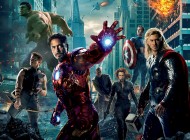

nothing super deep to say here, except that yeah, you’re spot on. I loved Ang Lee’s hulk, and you did a great job of defending it.
I actually just watched the new hulk this past weekend, since it was released on DVD last week. I enjoyed the 1st hulk. I however enjoyed this new one better. I am in my mid 30’s so I grew up with the tv series and only mildly exposed to the comics.
I really suffered a state of nostalgia in this new one when Bill Bixby was on screen, when the familiar piano was added to the soundtrack ever so subtle and the cameo by Lou… Loved it…